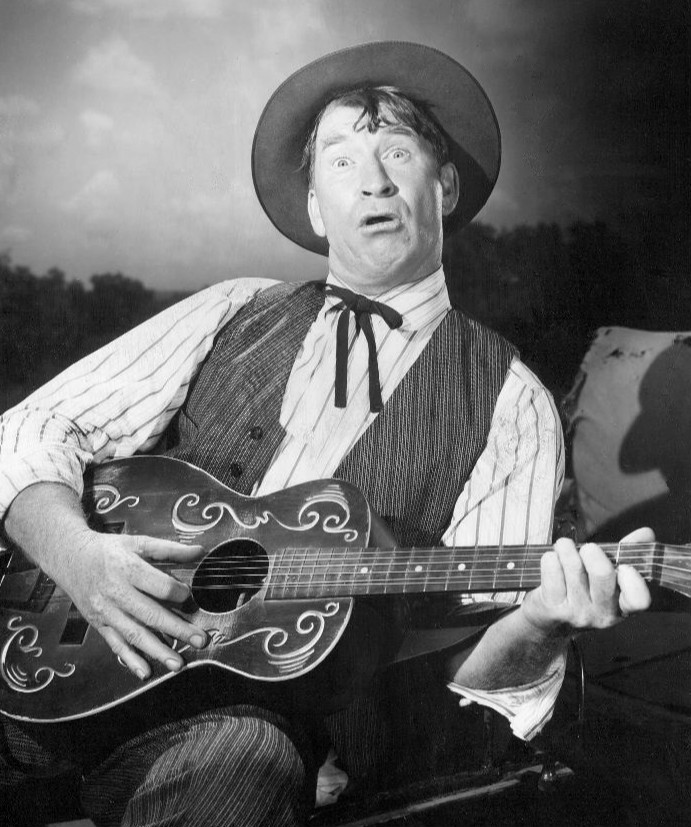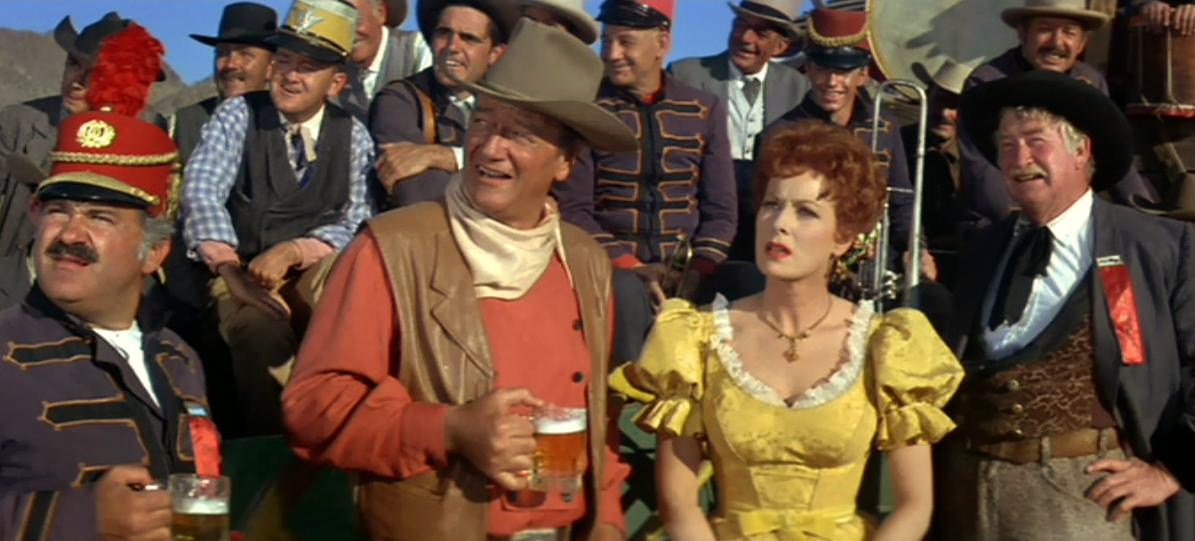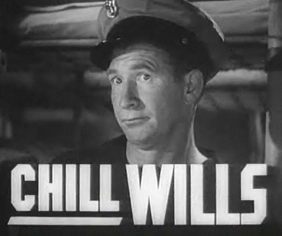1. Early Life
Chill Wills was born Theodore Childress Wills in Seagoville, Texas, on July 18, 1902.
1.1. Childhood and Education
Wills began performing from an early age, stepping onto the stage as a vaudevillian at the age of 12. His early life in Texas laid the foundation for his distinctive voice and Western persona that would later define much of his career.
1.2. Early Activities
In the 1930s, Wills formed and led his own singing group, the Avalon Boys quartet, sometimes known as "Chill Wills and his Avalon Boys". This period marked his initial foray into the entertainment industry, establishing his presence as a performer before his extensive acting career began.
2. Music Career
Wills' music career was primarily defined by his leadership of the Avalon Boys quartet, which gained popularity in the 1930s.
2.1. The Avalon Boys
The Avalon Boys quartet, led by Chill Wills, became notable for their musical performances. Their distinctive sound, featuring Wills' deep voice, earned them recognition. A significant highlight of their career was their appearance in the 1937 Laurel and Hardy comedy film Way Out West. In this film, Wills not only appeared with the Avalon Boys Quartet but also provided the deep bass voice for Stan Laurel's performance of "The Trail of the Lonesome Pine", a role that garnered critical acclaim. The group also performed at Hollywood nightclubs, including the famous Trocadero. Their performances caught the attention of an RKO executive, leading to Wills' early film appearances. After appearing in a few early Western films, Wills disbanded the Avalon Boys in 1938 to focus on his burgeoning solo acting career.
3. Acting Career
Chill Wills embarked on an extensive acting career following his musical endeavors, appearing in numerous films and television series, often utilizing his memorable voice.
3.1. Film Career
Wills' film career began with appearances in several low-budget Western films. During the 1940s, he was a contract player for Metro-Goldwyn-Mayer, continuing to appear prominently in Westerns. Beyond this genre, Wills also took on a variety of dramatic roles. He played the personification of "the City of Chicago" as a phantom police sergeant in the 1953 film noir City That Never Sleeps. Another significant dramatic role was that of Uncle Bawley in the acclaimed 1956 film Giant, where he appeared alongside Rock Hudson, Elizabeth Taylor, and James Dean. His final film role was in 1978, portraying a janitor in Stubby Pringle's Christmas.

3.2. Television Career
Wills also had a notable presence in television, appearing in various series throughout the 1950s, 60s, and 70s. In 1959, he starred as Bije Wilcox in "The Bije Wilcox Story" episode of the popular Western series Wagon Train. The following year, in Rory Calhoun's Western series The Texan, Wills took on the lead role in the episode titled "The Eyes of Captain Wylie" (1960).
He starred in Frontier Circus, which aired for a single season from 1961 to 1962 on CBS. In 1962, he guest-starred in the Western series Gunsmoke as the title character "Abe Blocker," a deranged mountain man and old friend of Marshal Matt Dillon. His character's murderous rampage ultimately led to his violent death. In 1966, Wills was cast as Jim Ed Love, a shady Texas rancher, in The Rounders, a short-lived comedy/Western series. This role was a reprisal of his character from the 1965 film of the same name, which starred Henry Fonda. He co-starred in the series with Ron Hayes, Patrick Wayne, and Walker Edmiston.
In 1968, Wills made another appearance on Gunsmoke in the episode "A Noose for Dobie Price". He played Elihu Gorman, a former outlaw who teams up with Marshal Matt Dillon, portrayed by James Arness, to pursue an escaped member of his old gang. In 1971, he appeared as Pat Reedy on The Men from Shiloh, the rebranded title for the TV Western The Virginian, in an episode titled "The Angus Killer".
3.3. Notable Voice Work
One of Wills' most distinctive contributions to film was his voice work, particularly as Francis the Talking Mule in a series of films. Wills provided the voice for Francis, a cynical and sardonic mule, lending his deep, rough voice with its characteristic Western twang to the character. Despite his prominent vocal role, Wills was typically uncredited for this work, which was a common practice at the time for voice actors. However, he appeared on-screen in a significant role as the blustery General Ben Kaye in the fourth film of the series, Francis Joins the WACS.

4. Major Achievements and Public Life
Chill Wills' career included significant professional milestones and notable engagements in public life, extending beyond his acting roles to his political affiliations and personal hobbies.
4.1. Academy Award Nomination and Campaign
Wills received a nomination for the Academy Award for Best Supporting Actor for his role as Beekeeper, a companion of Davy Crockett, in the 1960 film The Alamo. However, the publicity campaign surrounding his nomination was widely criticized for being aggressive and was considered by many, including the film's star, director, and producer John Wayne, to be in poor taste. Wayne publicly apologized for the campaign, which had been orchestrated by Wills' publicity agent, Wojciechowicz "Bow Wow" Wojtkiewicz. Wojtkiewicz later accepted full blame for the ill-advised effort, asserting that Wills had no knowledge of its specifics. The Academy Award for Best Supporting Actor that year ultimately went to Peter Ustinov for his role as Lentulus Batiatus in Spartacus.
4.2. Political Affiliations and Activities
Wills was also active in American politics. In 1963 and 1964, he joined actors William Lundigan, Walter Brennan, and Efrem Zimbalist Jr. in making appearances to support U.S. Senator Barry Goldwater, the Republican nominee, during his presidential campaign against U.S. President Lyndon B. Johnson. Later, in 1968, Wills chose not to support Richard Nixon for the presidency. Instead, he served as the master of ceremonies for George Wallace, the former governor of Alabama, during Wallace's California campaign stops in his presidential campaign. Wills was one of the few Hollywood celebrities, alongside Walter Brennan, who publicly endorsed Wallace's bid against Nixon and Hubert H. Humphrey.
4.3. Poker and Other Interests
Beyond his entertainment career, Wills was an avid poker player. He was a close friend of Benny Binion, the founder of the World Series of Poker and former owner of Binion's Horseshoe Casino in Las Vegas, Nevada. Wills participated in the inaugural World Series of Poker, held in 1970.

5. Personal Life
In 1928, Chill Wills married ballet dancer Hattie Elizabeth Chappell, often known as Betty. The couple had two children. Hattie Elizabeth passed away in 1971. Two years later, in 1973, Wills remarried Novadeen Googe. He remained married to her until his death.
6. Death
Chill Wills died of cancer in Encino, California, on December 15, 1978, at the age of 76. Following his death, he was cremated and his remains were interred at Grand View Memorial Park Cemetery in Glendale, California.
7. Legacy and Assessment
Chill Wills left a significant mark on the entertainment industry with his distinctive voice and versatility across both music and acting.
7.1. Contributions and Recognition
Wills' contributions to music included his role as the leader of the Avalon Boys, a popular quartet in the 1930s, and his unique bass vocal work in films like Way Out West. His acting career spanned over four decades, with memorable performances in numerous Westerns, dramas, and comedies. He was particularly recognized for his voice work as Francis the Talking Mule, which became a cultural phenomenon. His nomination for an Academy Award for Best Supporting Actor for his role in The Alamo highlights his recognition within the film industry.
7.2. Criticisms and Controversies
Despite his achievements, Wills' career was not without its controversies. The aggressive publicity campaign surrounding his Academy Award nomination in 1961 was widely criticized for its tastelessness, even drawing a public apology from John Wayne, the director and star of The Alamo. This incident negatively impacted public perception of his professional conduct at the time. Furthermore, his strong political affiliations, particularly his public endorsement of George Wallace during the 1968 presidential campaign, also drew criticism from some segments of the public and Hollywood, given Wallace's controversial political stances.
8. Filmography
- It's a Gift (1934) as Campfire Singer (uncredited)
- Bar 20 Rides Again (1935) as Background Singer / Henchman
- Anything Goes (1936) as Member of The Avalon Boys (uncredited)
- Call of the Prairie (1936) as Singing Cowhand
- Hideaway Girl (1936) as Lead Singer of Avalon Boys
- Way Out West (1937) as Lead Singer of the Avalon Boys / Stan's Bass Singing (uncredited)
- Nobody's Baby (1937) as Amateur Hour Lead Quartet Singer
- Block-Heads (1938) as Midget in Elevator (voice, uncredited)
- Lawless Valley (1938) as Deputy Speedy McGow
- Arizona Legion (1939) as Whopper Hatch
- Trouble in Sundown (1939) as Whopper
- Sorority House (1939) as Mr. Johnson
- Racketeers of the Range (1939) as Whopper Hatch
- Timber Stampede (1939) as Whopper Hatch
- The Day the Bookies Wept (1939) as Man on Bus (uncredited)
- Allegheny Uprising (1939) as John M'Cammon
- Boom Town (1940) as Deputy Harmony Jones
- Wyoming (1940) as Lafe (uncredited)
- The Westerner (1940) as Southeast
- Sky Murder (1940) as Sheriff Beckwith
- Tugboat Annie Sails Again (1940) as Shiftless
- Western Union (1941) as Homer Kettle
- The Bad Man (1941) as 'Red' Giddings
- Billy the Kid (1941) as Tom Patterson
- Belle Starr (1941) as Blue Duck
- Honky Tonk (1941) as The Sniper
- The Bugle Sounds (1942) as Sgt. Larry Dillon
- Tarzan's New York Adventure (1942) as Manchester Montford
- Her Cardboard Lover (1942) as Judge
- The Omaha Trail (1942) as Henry Hawkins
- Apache Trail (1942) as 'Pike' Skelton
- Stand by for Action (1942) as Chief Boatswain's Mate Jenks
- A Stranger in Town (1943) as Charles Craig
- Best Foot Forward (1943) as Chester Short
- See Here, Private Hargrove (1944) as First Sergeant Cramp
- Rationing (1944) as Bus Driver (scenes deleted)
- Barbary Coast Gent (1944) as Sheriff Hightower
- Meet Me in St. Louis (1944) as Mr. Neely
- I'll Be Seeing You (1944) as Swanson
- Sunday Dinner for a Soldier (1944) as Mr. York
- What Next, Corporal Hargrove? (1945) as Sergeant Cramp
- Leave Her to Heaven (1945) as Leick Thome
- The Harvey Girls (1946) as H.H. Hartsey
- Gallant Bess (1946) as Chief Petty Officer
- The Yearling (1946) as Buck Forrester
- High Barbaree (1947) as Lars (uncredited)
- Heartaches (1947) as 'Breezie' Mann
- The Sainted Sisters (1948) as Will Twitchell
- Northwest Stampede (1948) as Mileaway
- The Saxon Charm (1948) as Captain Chatham
- That Wonderful Urge (1948) as Homer Beggs, Justice of the Peace, Monroe Township
- Family Honeymoon (1948) as Fred
- Loaded Pistols (1948) as Sheriff Cramer
- Tulsa (1949) as Pinky Jimpson (Narrator)
- Red Canyon (1949) as Brackton
- Francis (1950) as Francis the Talking Mule (voice, uncredited)
- The Sundowners (1950) as Sam Beers
- Rock Island Trail (1950) as Hogger McCoy
- Stella (1950) as Chief Clark (uncredited)
- High Lonesome (1950) as Boatwhistle, Ranch Cook
- Rio Grande (1950) as Dr. Wilkins (regimental surgeon)
- Oh! Susanna (1951) as Sergeant Barhydt
- Francis Goes to the Races (1951) as Francis the Talking Mule (voice, uncredited)
- Cattle Drive (1951) as Dallas
- The Sea Hornet (1951) as Swede
- Bronco Buster (1952) as Dan Bream
- Francis Goes to West Point (1952) as Francis the Talking Mule (voice, uncredited)
- Ride the Man Down (1952) as Ike Adams
- Small Town Girl (1953) as 'Happy', Jailer (uncredited)
- Francis Covers the Big Town (1953) as Francis the Talking Mule (voice, uncredited)
- City That Never Sleeps (1953) as Sergeant Joe, the 'Voice of Chicago'
- The Man from the Alamo (1953) as John Gage
- Tumbleweed (1953) as Sheriff Murchoree
- Francis Joins the WACS (1954) as General Benjamin Kaye / Francis the Talking Mule (voice)
- Ricochet Romance (1954) as Tom Williams
- Hell's Outpost (1954) as Kevin Russel
- Timberjack (1955) as Steve Riika
- Kentucky Rifle (1955) as Tobias Taylor
- Francis in the Navy (1955) as Francis the Talking Mule (voice, uncredited)
- Santiago (1956) as Captain 'Sidewheel' Jones
- Giant (1956) as Uncle Bawley
- Gun for a Coward (1957) as Loving
- Gun Glory (1957) as Preacher
- From Hell to Texas (1958) as Amos Bradley
- Alfred Hitchcock Presents (1958) (Season 4 Episode 2: "Don't Interrupt") as Mr. Kilmer
- The Sad Horse (1959) as Captain Connors
- The Alamo (1960) as Beekeeper
- Where the Boys Are (1960) as Police Captain
- Gold of the Seven Saints (1961) as Doc Wilson Gates
- The Little Shepherd of Kingdom Come (1961) as Major Buford
- The Deadly Companions (1961) as Turk, "a half-crazed card shark"
- Gunsmoke (1962) as Abe Blocker
- Young Guns of Texas (1962) as Preacher Sam Shelby
- McLintock! (1963) as Drago
- The Wheeler Dealers (1963) as Jay Ray Spinelby
- The Cardinal (1963) as Monsignor Whittle
- The Rounders (1965) as Jim Ed Love
- Fireball 500 (1966) as Big Jaw Harris
- Big Daddy (1969)
- The Over-the-Hill Gang (1969) as George Asque, retired Texas Ranger
- The Liberation of L.B. Jones (1970) as Mr. Ike
- The Over-the-Hill Gang Rides Again (1970) as George Asque
- Night Gallery (1970) as Heppelwhite (segment "The Little Black Bag")
- The Steagle (1971) as Tall-Guy McCoy
- Alias Smith and Jones (1972) in Season 2 Episode 19: "The Biggest Game in the West"
- Guns of a Stranger (1973) as Tom Duncan
- Pat Garrett & Billy the Kid (1973) as Lemuel
- Mr. Billion (1977) as Colonel Clayton T. Winkle
- Poco... Little Dog Lost (1977) as Big Burt
- Stubby Pringle's Christmas (1978) as Janitor